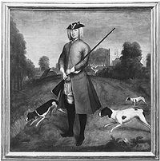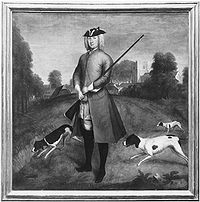
Charles Powlett, 3rd Duke of Bolton
Encyclopedia

Order of the Garter
The Most Noble Order of the Garter, founded in 1348, is the highest order of chivalry, or knighthood, existing in England. The order is dedicated to the image and arms of St...
PC (3 September 1685 – 26 August 1754) was a British
United Kingdom
The United Kingdom of Great Britain and Northern IrelandIn the United Kingdom and Dependencies, other languages have been officially recognised as legitimate autochthonous languages under the European Charter for Regional or Minority Languages...
nobleman and politician.
Paulet was the eldest son of Charles Paulet, 2nd Duke of Bolton
Charles Paulet, 2nd Duke of Bolton
Charles Paulet, 2nd Duke of Bolton KG PC was Lord Lieutenant of Ireland, Member of Parliament for Hampshire and a supporter of William III of Orange....
and Frances Ramsden, born in 1685 at Chawton
Chawton
Chawton is a village and civil parish in the East Hampshire district of Hampshire, England. It is 1.6 miles southwest of Alton, just south of the A31 which runs between Farnham and Winchester. The village is famous as the home of Jane Austen for the last eight years of her life...
. From 1685 until 1699 he was styled Earl of Wiltshire, and from 1699 until his accession, Marquess of Winchester.
He was Whig
British Whig Party
The Whigs were a party in the Parliament of England, Parliament of Great Britain, and Parliament of the United Kingdom, who contested power with the rival Tories from the 1680s to the 1850s. The Whigs' origin lay in constitutional monarchism and opposition to absolute rule...
MP
Member of Parliament
A Member of Parliament is a representative of the voters to a :parliament. In many countries with bicameral parliaments, the term applies specifically to members of the lower house, as upper houses often have a different title, such as senate, and thus also have different titles for its members,...
for Lymington
Lymington (UK Parliament constituency)
Lymington was a parliamentary borough in Hampshire, which elected two Members of Parliament to the House of Commons from 1584 until 1868, and then one member from 1868 until 1885, when the borough was abolished.-1584-1640:- 1640-1868 :...
from 1705 to 1708, Hampshire
Hampshire (UK Parliament constituency)
Hampshire was a county constituency of the Parliament of the United Kingdom, which returned two Knights of the Shire to the House of Commons from 1295 until 1832...
from 1708 to 1710 and Carmarthenshire
Carmarthenshire (UK Parliament constituency)
Carmarthenshire was a parliamentary constituency in Wales which returned one Member of Parliament to the House of Commons of the Parliament of the United Kingdom until its representation was increased to two members for the 1832 general election....
from 1715 to 1717. In 1739, he became a founding governor of the Foundling Hospital
Foundling Hospital
The Foundling Hospital in London, England was founded in 1741 by the philanthropic sea captain Thomas Coram. It was a children's home established for the "education and maintenance of exposed and deserted young children." The word "hospital" was used in a more general sense than it is today, simply...
in London
London
London is the capital city of :England and the :United Kingdom, the largest metropolitan area in the United Kingdom, and the largest urban zone in the European Union by most measures. Located on the River Thames, London has been a major settlement for two millennia, its history going back to its...
, an orphanage
Orphanage
An orphanage is a residential institution devoted to the care of orphans – children whose parents are deceased or otherwise unable or unwilling to care for them...
for abandoned children
Child abandonment
Child abandonment is the practice of relinquishing interests and claims over one's offspring with the intent of never again resuming or reasserting them. Causes include many social and cultural factors as well as mental illness. An abandoned child is called a foundling .-Causes:Poverty is often a...
.
On 21 July 1713, he married Lady Anne Vaughan, a daughter of the 3rd Earl of Carbery
John Vaughan, 3rd Earl of Carbery
Sir John Vaughan, 3rd Earl of Carbery KB, FRS , styled Lord Vaughan from 1643 to 1686, was Governor of Jamaica between 1675–1678....
. The marriage was not a happy one, and there were no children. In 1728, he began a long-standing affair with the English
England
England is a country that is part of the United Kingdom. It shares land borders with Scotland to the north and Wales to the west; the Irish Sea is to the north west, the Celtic Sea to the south west, with the North Sea to the east and the English Channel to the south separating it from continental...
actress, Lavinia Fenton
Lavinia Fenton
Lavinia Powlett, Duchess of Bolton , known by her stagename as Lavinia Fenton, was an English actress.She was probably the daughter of a naval lieutenant named Beswick, but she bore the name of her mother's husband. She was thought to have been born in Charring Cross, and had been a child...
. Lady Anne died in 1751 and the Duke married Lavinia Fenton on 20 October 1751 at Aachen
Aachen
Aachen has historically been a spa town in North Rhine-Westphalia, Germany. Aachen was a favoured residence of Charlemagne, and the place of coronation of the Kings of Germany. Geographically, Aachen is the westernmost town of Germany, located along its borders with Belgium and the Netherlands, ...
. She had already born him three illegitimate sons: Charles
Charles Powlett
The Reverend Charles Powlett was a noted patron of English cricket who has been described as the mainstay, if not the actual founder, of the Hambledon Club...
, Percy, and Horatio Armand Powlett.
The third Duke of Bolton died in 1754, aged 68, at Royal Tunbridge Wells
Royal Tunbridge Wells
Royal Tunbridge Wells is a town in west Kent, England, about south-east of central London by road, by rail. The town is close to the border of the county of East Sussex...
and was buried at Basing.
See also
List of deserters from James II to William of Orange|-

